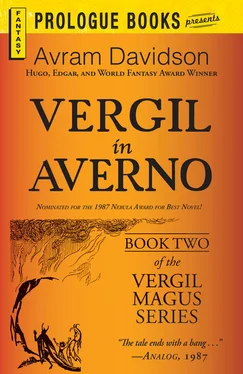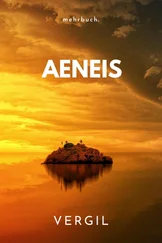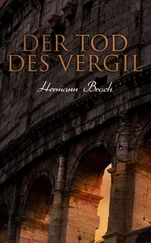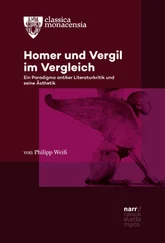Avram Davidson - Vergil in Averno
Здесь есть возможность читать онлайн «Avram Davidson - Vergil in Averno» весь текст электронной книги совершенно бесплатно (целиком полную версию без сокращений). В некоторых случаях можно слушать аудио, скачать через торрент в формате fb2 и присутствует краткое содержание. Жанр: Фэнтези, на английском языке. Описание произведения, (предисловие) а так же отзывы посетителей доступны на портале библиотеки ЛибКат.
- Название:Vergil in Averno
- Автор:
- Жанр:
- Год:неизвестен
- ISBN:нет данных
- Рейтинг книги:3 / 5. Голосов: 1
-
Избранное:Добавить в избранное
- Отзывы:
-
Ваша оценка:
- 60
- 1
- 2
- 3
- 4
- 5
Vergil in Averno: краткое содержание, описание и аннотация
Предлагаем к чтению аннотацию, описание, краткое содержание или предисловие (зависит от того, что написал сам автор книги «Vergil in Averno»). Если вы не нашли необходимую информацию о книге — напишите в комментариях, мы постараемся отыскать её.
Vergil in Averno — читать онлайн бесплатно полную книгу (весь текст) целиком
Ниже представлен текст книги, разбитый по страницам. Система сохранения места последней прочитанной страницы, позволяет с удобством читать онлайн бесплатно книгу «Vergil in Averno», без необходимости каждый раз заново искать на чём Вы остановились. Поставьте закладку, и сможете в любой момент перейти на страницу, на которой закончили чтение.
Интервал:
Закладка:
Avram Davidson
Vergil in Averno
Whereas in other cities they had taken him to see the bears and lions, the dancing girls and dancing boys, or the chambers with the painted walls, all quite commonly done, and in one city they had done a thing by no means common: they had shown him the treasury, crammed with rubies of Balas and of Balas-shan, male spider rubies and females of the same, diamonds and adamants and pearls the size of babies’ fists, ancient golden anklets and amulets and silver newly brightly minted, chryselephantine with turquoise and sapphire and stone of lapis lazuli — here they had taken him, with every mark of respect and favor, to see the torture-chambers instead.
He had gone.
Had he not gone, would they not have tortured?
Besides: Are not the pains of the few to be preferred to the pains of the many? Did not the distant Idumaeans say, “Pray for the welfare of the Empire, for were it not for fear of it, men would swallow one another up alive”? And yet the Idumaeans loved the Empire not.
But as for torture. . still. . In Rome, the Consul Pretorius, who “kept the king’s sword” (King! as though the title had not long ago been subsumed into a vaster one!) was able with his words and ways alone to wring secrets out of the most forsworn to silence, and in Athens old Illyriodorus did as much with dreams (though these were different secrets, clean different ones indeed), but in Averno different ways were kept (and clean different ones they were, too; if not precisely clean). They took Vergil to see the torture chambers, as one would go to see the bears.
There were no such chill dungeon deeps as had caused the captive in the Histories to exclaim, “How cold are your baths, O Romans!” All was well warmed, all along the deep stone steps (deeper, even, in the center of each, worn, probably, by the passage of many feet over the passing of many years) all along the deep stone steps and long stone corridors, and, indeed, well lighted as well. His host had paused to take up a wax tablet which stood upon a stand, as though he were taking up a menu; his host was the Magnate Brosa Brosa. “Hm,” said he, “this morning they have someone named” — the name meant nothing to Vergil, whatever it was — “who stands accused of conspiracy and interloping.” He raised his eyebrows. “ ‘Conspiracy and interloping,’ ” he repeated thoughtfully with slight change of emphasis. “Can’t have that.”
He stood aside and gestured courteously, asked, “Shall we go in, master?”
They went in.
Vergil had gone in first, with some polite murmur, but he did not at first go in very far; for, the door closing behind them with a heavy thud that for some reason somewhat sickened him (as some sounds do), it was at first dim-dark. But even before his eyes regained full vision — he had with him, always, of course, a source of light of his own, but did not care always, or even often, to make use of it — even then he was able to see that, first, there was some glow of light from somewhere; next he saw, in that dim glow, evidently the man being “put to the question” — horrid obliquity of phrase! — a man, a young man, well muscled and unclad and arms upraised and wrists in chains; but -
“At least he does not barber his armpits,” said the magnate-host. . hanging, thus, that beautiful body, and face intent and in pain, the young man naked and in chains: Vergil pitied him with all his heart, what matter for the moment all philosophy and polity and prating of the welfare of the Res Publica, the Public Thing: the State? The muscles of the arms and breast and belly moved and played and writhed, the upper body bent forward and moved, the chain moved somewhat; somewhere near, a bellows sighed and sounded: and, gods! what mattered where he shaved or not?
“Else we had not hired him.” The soft voice of the host in Vergil’s ear. “We want no perverts for this work, you know.”
Light.
The young man all naked and all sweat was not the victim. He was the torturer. The chains were not those of bondage, he had merely wound them round his wrists for purchase as he forced the bellows to force the fire, working it to heat his instruments. It was, of sorts, a shock. The young man’s pain was merely that of effort.
And when the actual prisoner, uncomely in body and in face, was lifted forward and fixed upon the frame, white hairs crawling upon bosom and belly — even then attention and favor, even pity, certainly sympathy, once fast-centered, moved and changed with difficulty. For one long, unlovely moment it had seemed right to Vergil, and proper, that youth and beauty should torture old age and ugly. . and, or. . at least. . wrong that it should be obliged to tarry there to do so, for, clearly (from the torturer’s straining muscles and concerned face — scarcely observed, the commencement of the question. . the questions. . When last did you conspire to admit interlopers unlicensed to the trade and commerce of the Very Rich City of Averno in violation of its strict and meritorious laws?) clearly, youth could take and took no pleasure in this association with age, and surely beauty would prefer the sunlight and the cooler air outside, the sweet smells of gardens and of fields to this hot room, dark, and fetid with sweat and fear. Clearly, surely, then (it seemed), age, ugly age, should at once confess and die and set youth free, unchained, to go forth once more into the light and air to play….
Then, suddenly, simul and semel with the first groan and scream, it came to him, Vergil, that there was “outside” no cooler air, no sweet smells, no gardens and no fields, little better light, and certainly little in the way of play: He was in Averno.
The very rich city.
How came he there?
“Master in Philosophy. Master in Arts Magical. Adept of the First Three Grades at Grammarie. Passed Master on the Astrolabe. Astrologue, West of Corinth, and Astrologue, East of Corinth.” The voice paused, continued. “But not yet Incantor et Magus.” The voice ceased. It had not asked a question; it had made a statement.
Vergil said, “Not yet.” Also a statement.
The man of the voice had entered the hot-wine shop a half-moment ahead of him, and only in that half-moment had Vergil half-realized (realized, that is, with half his mind) that the other’s striped robe had already been in the wine-shop lane when he himself turned into it. As for turning, the man had not turned up his face when Vergil had come to stand next to him. . indeed, could have stood nowhere much else, there being but that much little room at the small counter where the wine-pots squatted in their hot-water baths above the charcoal glow. Giving their orders as the dramster looked at each in turn, “White and sweet,” said one, “Red and spicy,” said the other. Vergil was that other, and this was no pre-arranged signal, to be responded to with some phrase such as I have the key to Memphis , countered with (perhaps) And I to Mizraim, such sports as boys employ to obtain entrance to clandestine gatherings of boys who cannot yet get girls. Had the dramster stood a bit nearer in offering the steamy cup with one hand and holding out the other for the two groats — an ancient buffoonery among street-players: Spare two groats for the bath, boss? What bath? The one in Lucu’s wineshop . . Change the name for every street, it still drew its laugh from loiterers — had this dramster’s stance not made it necessary for Vergil to turn a bit to the left, he would not even have seen the other wine-drinker’s face in profile: no extraordinary face, say of not quite three decades, with a sparse beard and large white teeth.
Читать дальшеИнтервал:
Закладка:
Похожие книги на «Vergil in Averno»
Представляем Вашему вниманию похожие книги на «Vergil in Averno» списком для выбора. Мы отобрали схожую по названию и смыслу литературу в надежде предоставить читателям больше вариантов отыскать новые, интересные, ещё непрочитанные произведения.
Обсуждение, отзывы о книге «Vergil in Averno» и просто собственные мнения читателей. Оставьте ваши комментарии, напишите, что Вы думаете о произведении, его смысле или главных героях. Укажите что конкретно понравилось, а что нет, и почему Вы так считаете.












